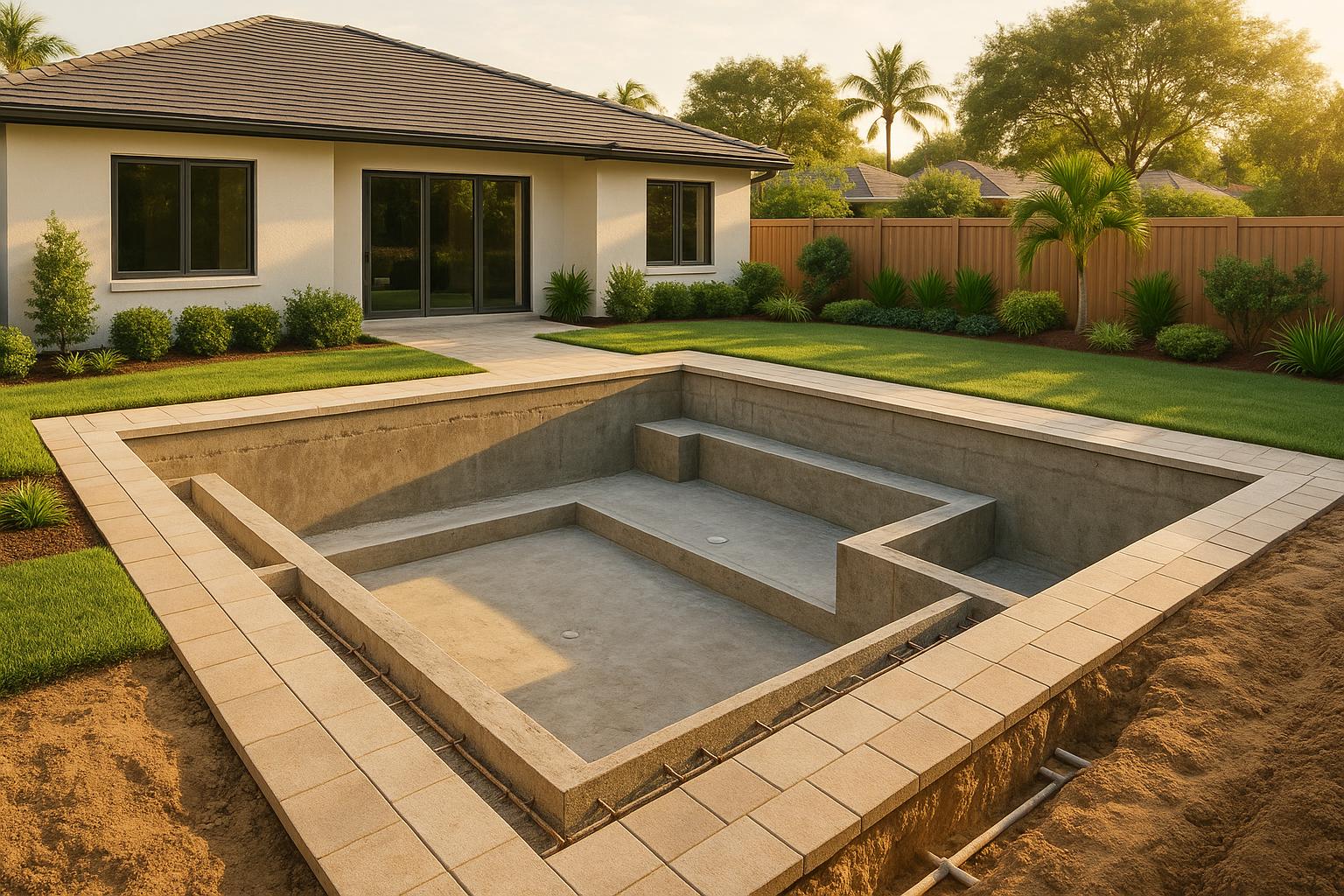How to Budget for Pool Construction in 2025
Building a pool in 2025 requires careful planning to avoid overspending and delays. With updated Florida regulations on energy-efficient equipment and stormwater management, budgeting is more important than ever. Here's what you need to know:
- Pool Types and Materials: Concrete pools are durable but costly, fiberglass pools are easier to maintain, and vinyl liner pools are affordable but need frequent replacements.
- Regulations: Safety features (fencing, alarms), permits, and hurricane-resistant designs are mandatory. Soil conditions and site accessibility can also impact costs.
- Main Costs: Include materials, labor, permits, equipment upgrades, safety features, and landscaping.
- Ongoing Expenses: Maintenance, utility costs, and occasional repairs should be factored in.
- Money-Saving Tips: Get multiple quotes, schedule construction during less busy months, choose standard designs, and bundle features during the initial build.
Set a clear maximum budget, include a 15–20% contingency for unexpected costs, and use tools like detailed spreadsheets or planning guides to track expenses. Hiring licensed contractors with Florida-specific expertise will ensure compliance with local rules and avoid costly mistakes.
The REAL Cost to Build a Pool in Florida (2025) | Full Breakdown
Pool Construction Costs in Florida
Building a pool in Florida comes with its own set of challenges and costs, shaped by the state’s climate, regulations, and unique conditions. The warm weather and nearly year-round swimming season drive demand for high-end features, while hurricane codes and environmental rules add extra layers to the budget. Let’s break down how factors like pool types, materials, and local regulations influence construction costs.
Pool Types, Materials, and Design Feature Considerations
In Florida, inground pools are by far the most common choice. Their costs can vary significantly based on size, materials, and added features, striking a balance between practicality and style.
- Concrete pools are a top-tier option, offering unmatched customization and durability. This is especially important in Florida, where intense sunlight and frequent storms can take a toll on less resilient materials.
- Fiberglass pools are gaining popularity due to their quick installation and smooth surfaces, which make cleaning easier and maintenance less demanding.
- Vinyl liner pools are the most affordable option upfront, but they may need periodic liner replacements due to prolonged exposure to the sun.
Adding features like saltwater systems, LED lighting, heating, and automation can increase costs, but they also bring added convenience and elevate the overall swimming experience.
Florida Regulations and Site-Specific Considerations
Regulations and site conditions in Florida play a big role in shaping pool construction budgets. Here’s what you need to know:
- Safety Features: Florida law requires pools to have barriers, self-closing gates, door alarms, and covers that meet specific safety standards. The cost of these features depends on the materials used and the size of the property.
- Permits and Hurricane Codes: Permit fees and requirements vary by county, but areas with stricter hurricane codes often face higher fees and longer approval times. Delays in permitting can also lead to increased material and labor costs.
- Soil and Drainage Challenges: Florida’s diverse soil conditions can add complexity. Coastal sandy soils may need extra excavation, high water tables might require specialized drainage systems, and clay-heavy areas could demand soil amendments to ensure stability.
- Hurricane Preparedness: Features like wind-resistant enclosures, storm-rated electrical systems, and secure pool equipment aren’t just smart - they’re often necessary for insurance compliance and protecting your investment.
- Environmental Rules: Stricter stormwater management regulations might require the use of retention systems or permeable surfaces. While energy-efficient equipment can come with a higher price tag, utility rebates may help offset some of these costs.
- Site Accessibility: Labor and installation costs can rise if your property has limited access for heavy equipment. Gated communities or areas with restricted construction hours may also require specialized tools and adjusted labor schedules.
In Florida, constructing a pool isn’t just about picking a design - it’s about navigating a mix of materials, features, and local conditions that all contribute to the final cost. With careful planning, you can create a pool that’s both functional and built to withstand the unique challenges of the Sunshine State.
Main Budget Categories for Pool Construction
Breaking down your pool budget into key categories is a smart way to avoid unexpected costs and keep everything on track. Let’s take a closer look at the main expenses that will shape your pool construction budget.
Core Costs: Materials, Labor, and Permits
At the heart of your pool budget are materials, labor, and permits. Materials often make up the biggest chunk of the cost, and the type of pool you choose plays a major role. For instance, concrete pools typically require more investment due to the need for reinforcement and detailed finishing. On the other hand, fiberglass and vinyl liner pools come with their own cost factors, including maintenance requirements.
Labor is another significant expense, especially in Florida, where skilled professionals handle specialized tasks like excavation, plumbing, and electrical work. To get a clear picture of these costs, request detailed bids from contractors. Don’t forget permits and inspections - they’re essential and can vary depending on your county. Checking local regulations early on can save you time and hassle.
Extra Costs: Equipment, Safety, and Landscaping
Beyond the basics, there are additional costs to consider. Pool equipment upgrades, such as energy-efficient pumps, filtration systems, and heaters, might cost more upfront but can save you money on utilities down the road. Safety features are another must-have. Think pool fencing, self-closing gates, and alarms - not only to meet local codes but to ensure everyone’s safety.
Then there’s the landscaping and decking around your pool. These elements not only enhance the look of your outdoor space but also add to the overall budget. Make sure to factor them in when planning your expenses.
Maintenance and Utility Expenses
The spending doesn’t stop once your pool is built. Ongoing costs kick in right away and continue for as long as you own the pool. Regular maintenance, operating pumps and heaters, and keeping everything running smoothly are all part of the deal. It’s also wise to plan for occasional repairs or equipment replacements, so you’re not caught off guard by future expenses.
sbb-itb-3649da6
Budget Planning and Money-Saving Methods
Planning your pool construction budget carefully can save you from unwelcome surprises. By using smart strategies, you can design a pool that fits your vision without stretching your finances.
Getting Accurate Contractor Quotes
Start by gathering itemized estimates from multiple licensed pool contractors in Florida. A detailed quote should break down costs for excavation, materials, labor, equipment, and permits, giving you a clear picture of where your money will go. This makes it easier to compare proposals and spot differences.
Pay attention not only to the total price but also to the quality of materials included. One contractor might offer a lower bid, but another might include upgrades or energy-efficient options that could save you money in the long run. Be sure to clarify what each estimate covers to avoid unexpected charges later. Having everything in writing is key to steering clear of hidden costs.
Once you’ve reviewed your quotes, the next step is to explore how timing and design choices can further trim your expenses.
Money-Saving Tips: Timing, Design, and Feature Bundling
After obtaining accurate estimates, you can use strategic timing and smart design decisions to balance quality with affordability. For instance, in Florida, pool construction tends to slow during cooler months. Many contractors offer seasonal discounts during this time, so scheduling your project when demand is lower could lead to reduced labor costs.
Your design choices also play a big role in your budget. Standard pool shapes are generally more affordable than custom or intricate designs. By choosing a classic shape, you can achieve a stunning look without breaking the bank.
If you’re planning to add extra features like waterfalls, lighting, or spa elements, consider bundling them into the initial build. Bundling these features can streamline the process and keep costs more manageable compared to adding them later.
Budget Tracking Tools
Keeping track of your spending is crucial to staying within budget. Use a budget worksheet to compare estimated costs with actual expenses across different categories. Regularly updating this worksheet can help you spot potential overspending and adjust your plans as needed.
For instance, tools like Revio's Pool Planning Guide come with worksheets specifically designed for pool construction. These can help you organize your costs and monitor your spending throughout the project.
It’s also wise to set aside a contingency reserve for unexpected expenses. Challenges like unforeseen site conditions during excavation can pop up, and having a financial cushion ensures these surprises won’t throw your project off course.
Choosing Pool Contractors in Florida
Hiring the right contractor can make all the difference - preventing delays, keeping costs under control, and guaranteeing top-notch quality.
Checking Contractor Credentials and Experience
In Florida, pool contractors must hold a valid license issued by the DBPR's CILB. This licensing ensures they meet the state's construction and regulatory standards. You can verify a contractor’s license through the DBPR website to ensure they’re qualified.
Beyond licensing, it’s essential to confirm that your contractor carries general liability and workers' compensation insurance. Without proper insurance, you could be financially responsible if an accident occurs on your property. Always ask for up-to-date insurance certificates and make sure the coverage is adequate for your project.
To dig deeper, ask for references from previous clients and, if possible, visit completed projects. Seeing how pools hold up - especially in Florida’s relentless summer heat and severe weather - can give you a clearer picture of the contractor’s workmanship. Once you’ve confirmed their credentials, you can simplify the process by using a trusted contractor-matching service.
Using Revio for Contractor Matching
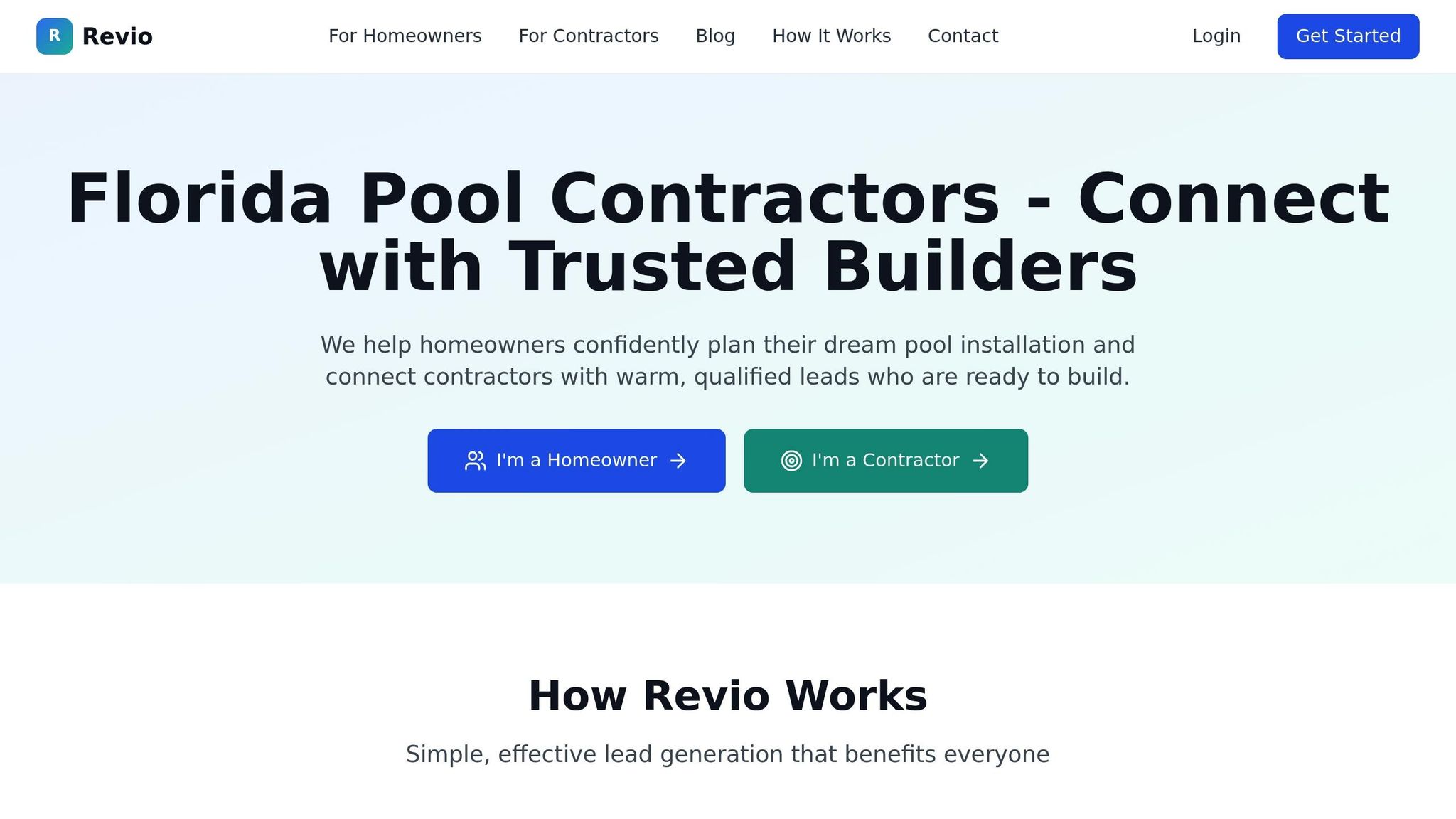
Revio is a handy tool for Florida homeowners, connecting them with pre-screened pool contractors who have been vetted for their licensing, insurance, and experience. This approach not only saves time but also helps reduce potential risks.
Revio also provides a Pool Planning Guide, which includes a comprehensive contractor checklist. This guide is a valuable resource for asking the right questions during interviews and comparing proposals. It covers critical topics like permits, equipment specs, and maintenance planning - ensuring you’re prepared to make informed decisions. While matching services are helpful, don’t overlook the importance of verifying your contractor’s regulatory expertise.
Meeting Florida Regulations
Navigating Florida’s pool construction regulations can be tricky, but staying compliant is non-negotiable if you want to avoid delays or unexpected costs. From excavation to the final inspection, your contractor must be well-versed in state and local requirements.
Make sure your contractor handles the entire permitting process, as regulations can vary significantly across counties. Some areas may have additional rules related to setbacks, drainage, or other factors that could impact construction methods and expenses.
It’s also critical to confirm that your contractor is familiar with Florida’s pool safety standards. A competent professional will incorporate these safety measures into the project from the start, rather than treating them as an afterthought.
Lastly, consider your contractor’s awareness of environmental concerns, such as protecting nearby water sources and managing construction runoff. Ignoring these regulations can lead to work stoppages and costly remediation, putting your budget at risk. A contractor who understands these nuances will help you avoid unnecessary headaches.
Planning Your Pool Project Budget
Once you understand the factors that influence costs and have some strategies for saving, it’s time to pull everything together into a solid budget plan. Building a pool requires thoughtful planning and realistic expectations to keep things on track financially.
Start by setting your maximum budget limit before diving into specific expenses. This step helps you avoid being tempted by upgrades that could push you over your limit. Be sure to include a 15–20% contingency fund to cover unexpected costs like rock removal, utility line adjustments, or delays in permits.
Keep a detailed spreadsheet that tracks every expense, from excavation to landscaping. This tool will be invaluable when comparing contractor bids and spotting areas where costs might be creeping up.
The timing of your project can also make a big difference in your budget. In Florida, scheduling construction during the off-season (typically November through February) can mean better contractor availability and possibly lower labor costs. However, keep in mind that rainy-season delays could still add to your expenses.
For Florida homeowners, Revio's free Pool Planning Guide is a fantastic resource. It offers detailed cost breakdowns, permit checklists, and tools to evaluate contractors. It even includes worksheets to help you plan for long-term maintenance costs, so you’re not just budgeting for the initial build.
When it comes to finalizing your budget, focus on the must-have features first. Extras like upgraded lighting, water features, or expanded decking can always be added later, once you have a better sense of how your family uses the pool.
Lastly, have an open and honest conversation with your contractor about your budget and expectations. This helps ensure they can propose cost-effective solutions that fit your plan, keeping your pool project enjoyable without turning into a financial headache.
FAQs
How can I save money on pool construction in Florida while staying compliant with local regulations?
To cut down on pool construction costs in Florida while staying within the rules, think about going with a smaller, standard-shaped pool and choosing budget-friendly materials like vinyl or fiberglass. These options can noticeably lower your initial expenses. Timing matters too - planning construction during the off-season could land you discounts from contractors.
It's also crucial to understand Florida's permitting and safety regulations to steer clear of fines or delays. Whether you review local guidelines yourself or hire experienced contractors familiar with these rules, staying informed can save you from surprise costs.
How do Florida's climate and environmental rules affect the choice of pool materials and features?
Florida's warm, humid climate significantly influences the choice of pool materials and features. For a pool to hold up against the state's high temperatures, you need to opt for durable, heat-resistant materials like specialized tiles and finishes. These materials not only handle the heat but also help prevent common issues like algae growth or discoloration. The humidity, on the other hand, can affect how well certain materials adhere, so selecting options built for long-term performance is essential.
Florida's environmental regulations add another layer of consideration. Pools must meet strict standards for water quality and drainage, which means installing efficient filtration and circulation systems is a must. These systems ensure compliance with safety and environmental guidelines while keeping your pool in top condition. By factoring in both the climate and regulatory requirements, you can choose materials and features that boost your pool's durability and keep it up to code.
What should I look for in a pool contractor in Florida to ensure they follow safety and legal standards?
When hiring a pool contractor in Florida, it’s essential to verify that they’re licensed by the Florida Construction Industry Licensing Board and meet all state-mandated requirements. A licensed contractor is equipped to follow Florida’s safety and sanitation standards, ensuring your project adheres to state regulations.
Be sure to request proof of licensing and insurance. It’s also a good idea to confirm that the contractor has experience navigating Florida’s specific regulatory guidelines. Don’t skip checking their references and online reviews - this can give you insight into their track record for quality work and customer satisfaction. Taking these steps can help you find a contractor who is dependable and fully compliant with state safety standards.
Tags:
Related Articles
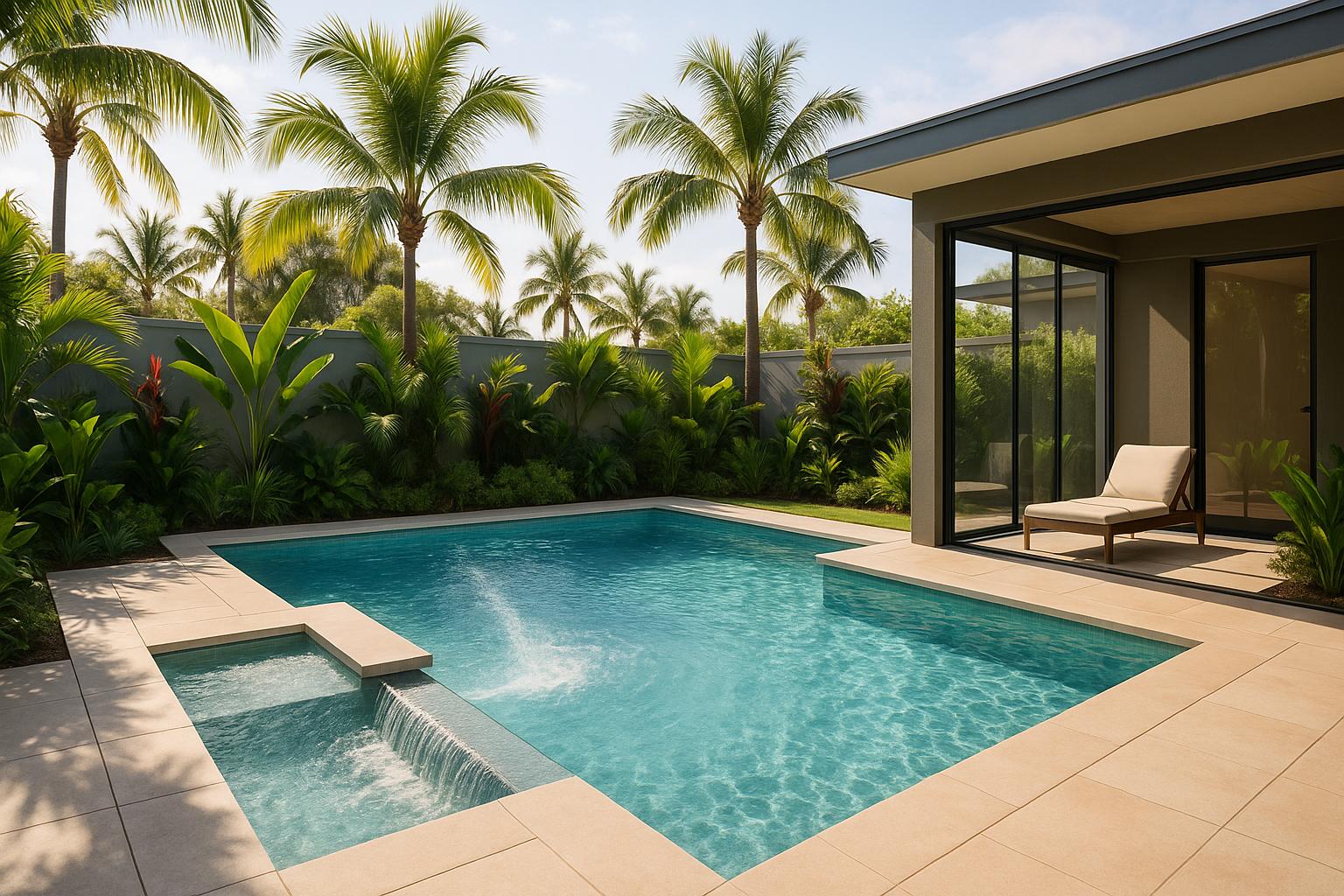
Best Pool Features for Florida Climate
Explore essential pool features for Florida's climate, including heat-resistant materials, cooling systems, and storm protection for year-round enjoyment.
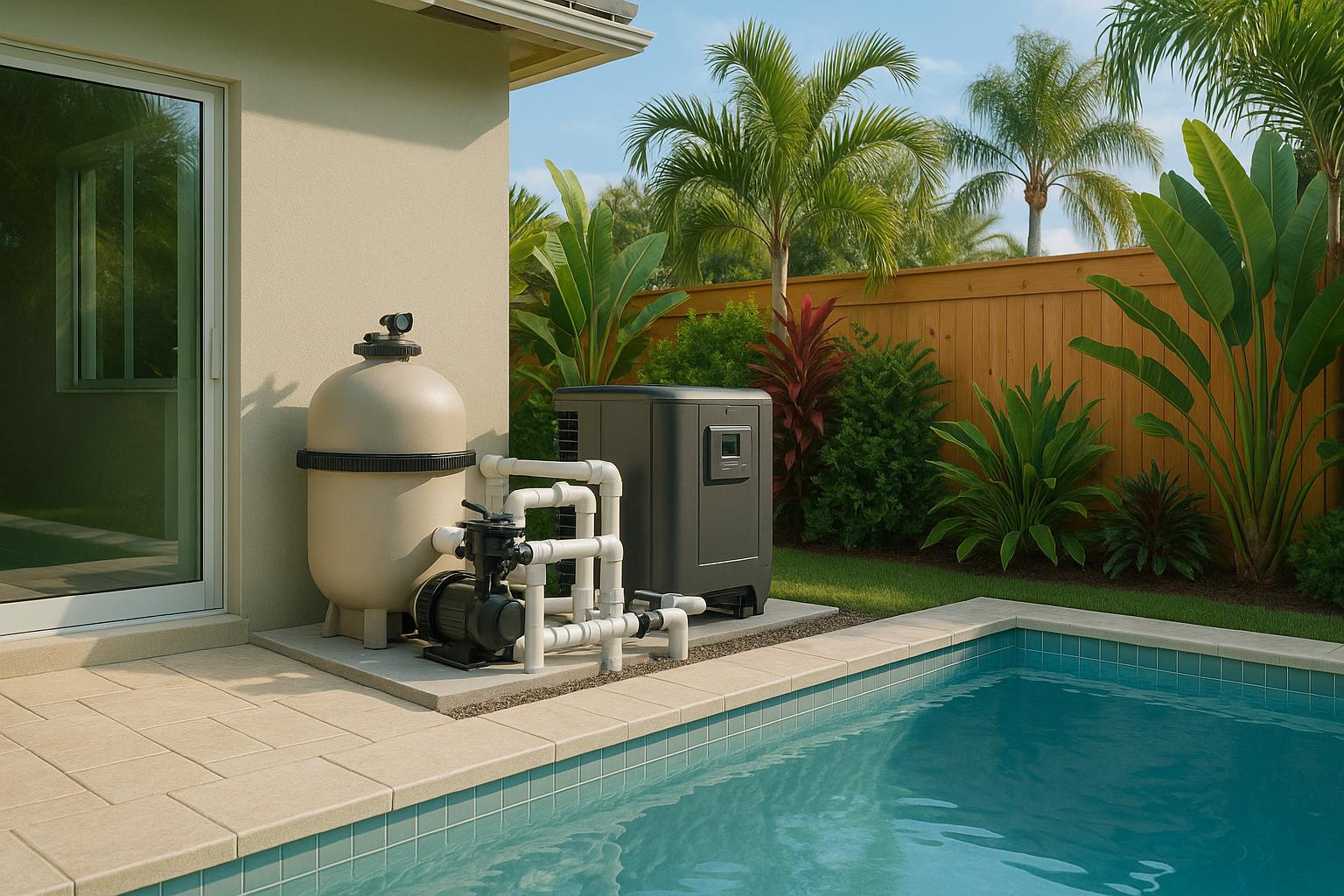
Florida Pool Equipment Installation Rules
Learn about Florida's pool equipment installation rules, including safety, licensing, permits, and compliance with local regulations.
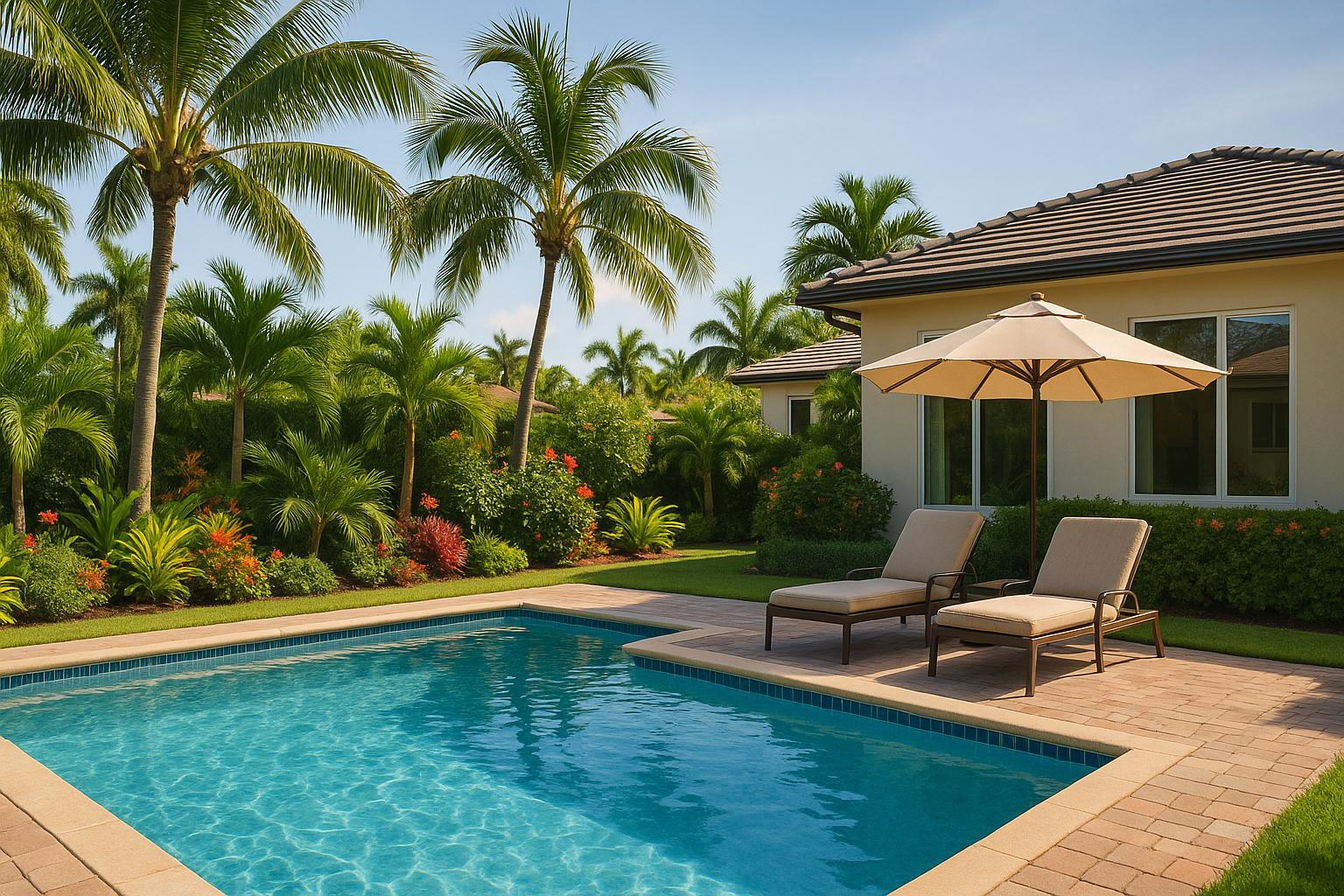
Top Florida Lenders for Pool Loans
Explore top lenders in Florida for pool financing, comparing rates, terms, and unique features to help you fund your dream pool project.
Ready to Start Your Pool Project?
Connect with trusted, pre-screened pool contractors in Florida
Get Started Today